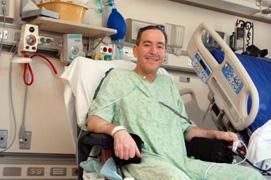August 12, 2010 - Chicago’s Northwestern Memorial Hospital heart rhythm specialists recently gave a 34-year-old man an implantable cardioverter defibrillator (ICD) that did not require X-ray assistance to install the usual lead wires to the heart.
August 12, 2010 – A 52-year-old male heart failure patient in Krakow, Poland, became the first human to receive the PliCath HF System for an epicardial catheter-based ventricular reconstruction (ECVR). The device is designed to treat heart failure (HF) by reducing the enlarged left ventricle (LV) through an anchoring system that is delivered across the cardiac chambers.
August 11, 2010 – Development of an optical coherence tomography (OCT) imaging system built into an angioplasty balloon is described in the journal Review of Scientific Instruments, which is published by the American Institute of Physics, holds the potential to greatly improve angioplasty.
Cardiac PET/CT represents a major advancement in cardiovascular diagnostics, offering significant clinical and ...

August 11, 2010 – The Bluhm Cardiovascular Institute of Northwestern Memorial Hospital recently implanted a patient with two of the smallest experimental ventricular assist devices (VADs) currently available for study in humans. VADs are designed to assist either the right (RVAD) or left (LVAD) ventricle, or both (BiVAD) at once.
August 11, 2010 – New sizes of the SoloPath TransFemoral Endovascular Access Catheter were recently cleared by the U.S. Food and Drug Administration (FDA). The new sizes provide the potential to treat a larger patient population.
August 11, 2010 – More than 50 percent of cardiologists in a recent survey gave the health reform bill unsatisfactory marks, grading it as a D or an F. Only 1 percent of cardiologists graded it as an A and only 15 percent as a B.
SPONSORED CONTENT — Studycast is a comprehensive imaging workflow system that allows healthcare professionals to work ...
August 11, 2010 – Based on its recent analysis of the computed tomography (CT) market, Frost & Sullivan recognizes Siemens Healthcare with the 2010 North American Frost & Sullivan Award for Technology Leadership of the Year.
August 10, 2010 - A cardiovascular image reporting, consulting and training company in Brazil, entered into a multi-user 3Di software licensing contract with Shina Systems.
August 9, 2010 - Health care professionals will attend a conference devoted to the fundamentals of establishing and developing a cooling program and features Minneapolis physicians and other national experts, Miracle on Ice: Therapeutic Hypothermia for Cardiac Arrest Patients conference will take place September 9 to 10, in Minneapolis, Minn.
Providing exceptional cardiovascular care for patients to achieve the best possible outcomes is the number one goal for ...
August 9, 2010 - Researchers at Mayo Clinic are working to reduce radiation dosages used to acquire perfusion and other CT images.
August 9, 2010 – Enrollment was recently completed in a clinical trial of Medtronic’s Complete SE (self-expanding) vascular stent for the treatment of atherosclerosis in the superficial femoral artery (SFA), including the proximal popliteal artery (PPA).
August 9, 2010 – According to Millennium Research Group (MRG), a medical technology market research company, Invatec has traditionally held a much stronger position in the European percutaneous transluminal angioplasty (PTA) balloon catheter market compared to the United States.
Cardiac positron emission tomography (PET) is growing in popularity among cardiologists because it provides the ability ...
August 9, 2010 – A merger is being finalized between Medtronic and cardiac surgery device maker ATS Medical. The company develops and manufactures products and services for the treatment of structural heart disease and the ablation of cardiac arrhythmias. ATS Medical expects the closing of the merger will take place on or about Aug. 12.
August 4, 2010 — A second-generation of the Diamondback Predator 360 peripheral arterial disease (PAD) system features improvements in the crowns and shaft for enhanced clinical performance and shorter procedure times. The U.S. Food and Drug Administration (FDA) recently granted Cardiovascular Systems Inc. (CSI) special 510(k) marketing clearance for the device.
August 4, 2010 — When Beaumont Hospital physicians recently held a heart screening for high school students, they found some surprising results. Of the 402 students screened, 34 students were advised to continue with sports and follow-up with their personal physicians and an additional five students were instructed to stop exercise until fully evaluated.

 August 12, 2010
August 12, 2010












